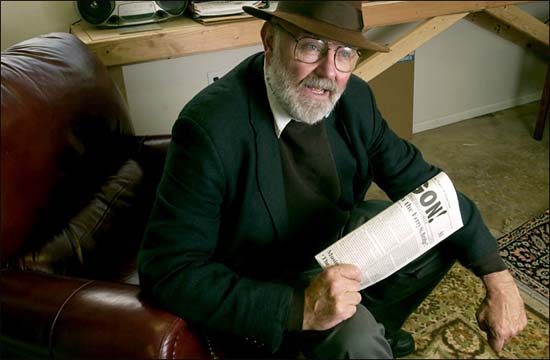
Malaysia RPCV Bruce Anderson called America's "last horse-whippable editor"
A tilt toward controversy
* Bruce Anderson has been described as America's "last horse-whippable editor."
(Randi Lynn Beach / For The Times)
By Rone Tempest, Times Staff Writer
BOONVILLE, Calif. -- Even in a career championing unpopular causes, Boonville newspaper editor Bruce Anderson's recent defense of a convicted child molester is something new.
Three recent issues of the Anderson Valley Advertiser, the iconoclastic Mendocino County weekly newspaper that Anderson owns and edits, have been devoted largely to the case of a former long-haul truck driver convicted in 1995 of charges that he molested three girls, including a 10-year-old.
Anderson revisited the 8-year-old case after he was contacted from prison by the convict, a former Boonville resident, who begged him to examine the court record. The resulting articles, which included a graphic retelling of the original charges that offended some readers, are typical of Anderson's attack style.
With characteristic flair, he has preceded each article with a provocative quote from "Lolita," novelist Vladimir Nabokov's famously sympathetic portrayal of a professorial pederast.
A broad-shouldered, 63-year-old former Marine and Peace Corps volunteer who is as courtly in person as he is caustic in print, Anderson is a throwback to the days when the cantankerous independent newspaper editor was a fixture in rural America. Almost no one escapes his scathing pen.
Right-wing ranchers are the "rural fascist league." Radical feminists, environmentalists and assorted revolutionaries are dismissed as "self-appointed righteous ones, correct on all matters, social, political and historical." Yuppies are "cheese and white wine sip liberals." Wealthy retirees in ridgeline mansions overlooking the picturesque Anderson Valley are, in Anderson-speak, "the Golden Horde" or "hill muffins." Teenagers listening to loud rap music in the town center are "morons playing moron music."
Anderson has been described by some as California's version of H.L. Mencken, the 1920s Baltimore journalist famous for his broadsides at the American middle class. One letter to the editor characterized Anderson as America's "last horse-whippable editor."
"I think the Anderson Valley Advertiser is the best small newspaper in America," said media critic Alexander Cockburn, who lives in Humboldt County and is a regular contributor to the Boonville newspaper, as well as to the Nation and the Los Angeles Times.
"It does things that a lot of newspapers have given up doing," Cockburn added. "Bruce is completely fearless, a very good writer and very funny -- a polemical writer in the Mencken tradition. There aren't too many of them around."
In two decades at the helm of the 3,500-circulation Advertiser, which draws subscribers from across the country and even overseas, Anderson has been jailed for punching a local school official, has ignored death threats to write about an underworld arson ring, has stoked a literary potboiler involving the whereabouts of reclusive novelist Thomas Pynchon and has unflinchingly attacked nearly every sacred cow around.
But Anderson's taking up the case of 42-year-old former truck driver Mark Sprinkle, serving a 45-years-to-life sentence in Mule Creek State Prison, takes him closer to the edge than ever. Even longtime friend Cockburn said he found some of the accounts distasteful, bordering on "prurient."
In long, front-page articles, Anderson has contended that Sprinkle was set up by a vengeful ex-girlfriend, entrapped by a precociously mature 13-year-old and persecuted by a team of "man-eating" district attorneys.
Part of his decision to tackle the case, Anderson said, was his belief that the sentence was too harsh, "far out of proportion to the crime." He reported that Sprinkle, who has always claimed that he is not guilty, had turned down a three- to five-year sentence that was part of a plea bargain offered by prosecutors.
But Anderson said he also had a gut feeling about Sprinkle, whom he had watched grow up in Boonville. "He was a tough kid," Anderson said, "but not a bad one. I just never saw him as a child molester."
In 1995, Sprinkle was charged with fondling and molesting the three girls after they disrobed in his truck. The girls, two 13-year-olds and a 10-year-old, testified that they disrobed on their own volition, not at Sprinkle's behest. The complaint was filed 18 days after the incident by Sprinkle's ex-girlfriend.
Sprinkle denied that he touched the girls and insisted on his innocence.
Anderson sees the Sprinkle case as an example of political correctness that runs through a Mendocino County government dominated by late-60s, college-educated migrants into the land of redwoods. In this world, he says, a blue-collar local tough charged with child molesting has almost no chance of a fair hearing before local authorities.
"Their liberal thinking on a lot of things," said Anderson, "is more conventional, more lock-step, more entrenched than what it replaced. This invincible, serene smugness keeps me angry just about all the time."
There is an impetuous quality to many of Anderson's crusades. He makes a decision and then fires away. His sympathies are much more likely to be with the working-class kid who's had a few scrapes with the law than with the yuppie with the spotless record, more on the side of the street cop than the judge.
One of the slogans printed under the newspaper logo is: "Peace to the Cottages! War on the Palaces!"
"I do a lot of these low-life stories," Anderson explained in an interview at his book-lined home just outside Boonville. "What's distressing about a lot of these cases is that the courts just give them a fast shuffle."
With typical rampaging rhetoric, Anderson attacks the female prosecutor in the Sprinkle case as "the scourge of errant male sexuality in Mendocino County for nearly two decades."
Obviously, this is not your typical small-town weekly newspaper. But then Boonville, a town of 974 people nestled between coastal mountain ranges three hours north of San Francisco, is not your typical small town. Surrounding Mendocino County is a cultural collision of ex-hippies, well-to-do vintners, marijuana cultivators, laid-off loggers and Bay Area retirees.
"Back when I bought this newspaper in 1983," Anderson said, "I realized that the population here was so wildly diverse that no matter what I published, I was bound to offend some people. So I decided to make a kamikaze run at it."
Anderson has won a surprisingly wide following, even in places not covered in his articles. More than half of the Advertiser's subscribers live outside Northern California, including people from most states and several overseas diplomatic posts.
Appreciation for the newspaper, in fact, appears to increase in direct proportion to the distance between the reader and Boonville. Close to home, a day seldom goes by without a confrontation with an angry, insulted reader. It is not unusual for Anderson to chase off people with one of the several guns he keeps on the property.
He lives in a sprawling walled compound that includes separate residences for his 87-year-old mother, a Latino farm family that Anderson befriended and an African American man who came to the Andersons as a foster child in the 1980s and who peddles the newspaper on the streets of Ukiah.
Last year Anderson and his wife, Ling, a former Malaysian schoolteacher he met while in the Peace Corps, acquired a pit bull guard dog they named Roscoe, who spends most of his time lolling on the redwood deck of their home.
"A local newspaper owner can dish it out, but he takes a lot of abuse too," said Anderson, a book collector who does most of his writing in a cramped, converted pump house loft that resembles a guard tower. "No matter how tough you are, it can get to you."
Public officials tend to give a wide berth.
Susan Massini served as Mendocino County district attorney from 1987 to 1999 and was a regular foil for Anderson, particularly after she led the effort to jail him for punching the Mendocino County schools superintendent. The blow was in retaliation for the official's having called Anderson "a third-rate McCarthyite."
"He was for me until I prosecuted him," said Massini, who now works for the county child support office in Ukiah. "He just had a bigger forum than the other people I prosecuted. He uses his newspaper as a private weapon."
Anderson has had his share of fiascoes. In 1988 he published what he thought was an obviously satirical phony interview with then-Rep. Doug Bosco. Unfortunately, many people who read the article, published under the byline of a political reporter, thought it was real.
The story, for which Anderson later apologized, quoted Bosco in a scathing dismissal of environmentalists as "malcontents who couldn't care less about anything else but where their next joint is coming from."
About the same time, Anderson convinced himself and many others, including visiting national correspondents from major dailies, that a very popular contributor to his lively letters-to-the-editor column was reclusive novelist Thomas Pynchon, writing under the pseudonym Wanda Tinasky.
Some circumstantial facts supported this idea. "Tinasky" was a very good and clever writer, fond of Pynchonesque puns. Pynchon was rumored to be in the area, researching his book "Vineland."
Even when the letters stopped in 1988, the Pynchon rumors continued.
Complaints by the Pynchon family led to an investigation by Vassar College professor Don Foster, a specialist in authenticating authorship.
Foster traced the Tinasky letters to a former postal worker and minor Beat Generation writer named Donald Hawkins. The letters had stopped abruptly in 1988 because Hawkins had murdered his wife and then killed himself, driving off a cliff into the Pacific Ocean.
Still, Anderson has scored some coups. The stories he wrote from jail after his 1986 arrest led to the building of a new facility. His relentless campaigning won public access to the county law library, which previously had been the exclusive domain of judges.
In 1994-95 he exposed an organized arson ring in Fort Bragg, resulting in several arrests. This led to a number of threats on his life, and for a time he carried a .38-caliber handgun for self-defense.
"People always complain about how angry he makes them," said Johnny Schmitt, owner and chef at the Boonville Hotel. "I think we're lucky to have him. He creates a forum. We have a real newspaper, not a small-town shopper.
"If you don't like his opinion, you can always write and join the fun."
If you want other stories on this topic, search the Archives at latimes.com/archives.








